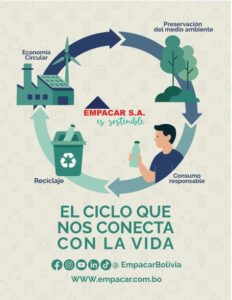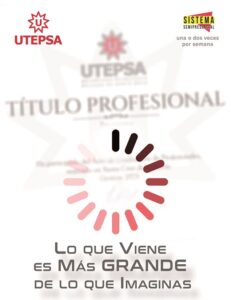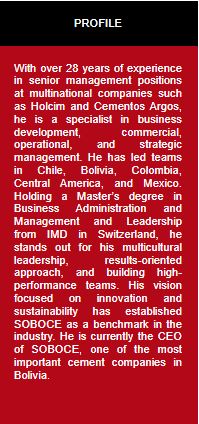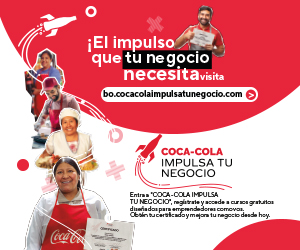The executive, whose work has been highlighted in various national media outlets, stands out for his commitment to sustainability. This focus makes him a key reference for this interview, related to the comprehensive management of one of Bolivia’s most important cement companies.
ISSUE 141 | 2025
Vesna Marinkovic U.
1What role does sustainability play at SOBOCE as part of its business strategy?
At SOBOCE, sustainability is not an accessory: it is one of the two strategic pillars supporting our business vision, alongside innovation. Both principles guide our decisions and actions to generate a positive impact on society and contribute to a more responsible industry.
2What are the peculiarities of sustainability in SOBOCE’s business management?
Sustainability in our management implies a profound transformation. It is not only about reducing emissions but also about incorporating environmental, social, and governance criteria into all our operations. We have mainstreamed this approach across every area of the company, from production to logistics, from community relations to the development of new products.

3Is doing business in today’s world, especially in an economic and energy crisis context like Bolivia’s, a complicated challenge?
Doing business in the current context is indeed a challenge. But we believe that moving toward a low carbon economy is not only the right thing to do, it is also good business. It forces us to be more efficient, to rethink processes, and to innovate. The biggest challenge is building an organizational culture where every employee is an ambassador for sustainability.
4SOBOCE is approaching its 100th anniversary as a leading company in the production and commercialization of cement, ready-mixed concrete, aggregates, and construction services in Bolivia. What have been the biggest challenges and successes?
Throughout nearly 100 years of existence, SOBOCE has faced great challenges and achieved significant milestones. We have been part of building the country, not only in major infrastructure projects but also in the homes of thousands of Bolivian families. One of the most important recent challenges has been confronting an unfair legal process seeking to harm our company with a multimillion-dollar penalty. Despite this, we remain steadfast in our commitment to Bolivia.


5Has modernizing your plants been the only factor improving the company’s sustainability?
Modernizing our plants has been a key element, but not the only one. We have invested millions of dollars in vertical roller mill technology, which is more energy-efficient. However, we have also worked on innovating eco-efficient products, co-processing fuels derived from waste in our kilns, reusing water in our production processes, and electrifying our transportation.
6Has the reduction of the company’s carbon footprint, carried out under GRI standards, been satisfactory?
Definitely. A few months ago, we presented our first Sustainability Report under the Global Reporting Initiative (GRI) standards, marking a milestone in transparency. One of the most significant advances was the launch of Cemento Viacha Eco Premium Plus, with a carbon footprint 22% lower than other cements, certified by IBNORCA. This reflects a concrete step toward decarbonizing the sector.
7What has been the impact of renewable energies on SOBOCE’s business management in recent years?
We have committed to an ambitious energy transition: co-processing fuels derived from urban solid waste as an energy source. This technology allows us to transform discarded waste into fuels for our kilns, thus advancing the circular economy and helping to solve one of the biggest environmental problems in our cities.

